Each year in April, SMART members travel to Washington, DC, to gather with fellow trade unionists for the North America’s Building Trades Unions (NABTU) Legislative Conference: a week for union members to forge alliances with pro-worker politicians, lobby for laws that benefit workers and strategize for a future that puts SMART to work. This year’s conference was no different; with a theme of “Foundations for the Future,” SMART local and International leaders spent April 21-24 working to secure a better tomorrow for working-class people across North America.
Tuesday: pro-worker allies demonstrate commitment, attendees hit the pavement in workshops
Tuesday’s conference began with a jam-packed plenary session, where attendees heard from government officials whose actions – not just their words – have benefited SMART members and families.
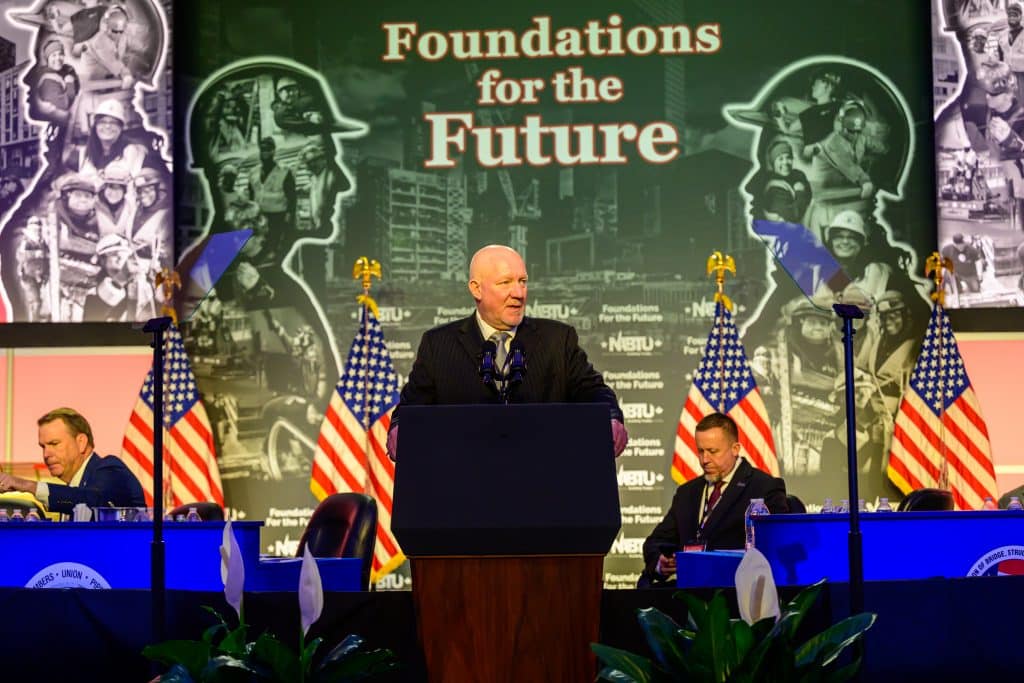
During his keynote address, NABTU President Sean McGarvey described the extraordinary difference building trades unions make in the lives of ALL workers across North America, from the apprentices who come from poverty and earn a union-made pathway into the middle class, to the workers building our nation’s transition to a green economy. He also outlined the progress unions have made in recent years: pro-worker laws that invest in our industries, an executive order from President Joe Biden requiring project labor agreements on large-scale federal construction jobs, permitting reform and expanded prevailing wage protections that raise pay for construction workers, to name just a few.
“Behind every policy win, behind every investment win, there are real workers’ lives at stake,” McGarvey reminded the capacity crowd. “We cannot back down, we cannot slow down – we must keep fighting.”
Minnesota Governor Tim Walz has been stridently pro-worker throughout his time in office, signing laws that establish air ventilation programs for public schools (with strong labor standards attached to create jobs for SMART Local 10 members); implement the most expansive prevailing wage enhancements in state history and the largest increase ever to the Minnesota work compensation system’s permanent partial disability fund; ban anti-union captive audience meetings; and much more (including a two-person freight train crew law).
“It’s not about winning races so you can get more political capital to go out and win another race,” he declared. “You win races so you can burn the hell out of that political capital to improve people’s lives.”
Walz described how desperately needed repairs to the Blatnik bridge that connects Duluth, Minnesota, to Superior, Wisconsin, can finally be made thanks to funding from the federal Bipartisan Infrastructure Law. But that funding – and the union jobs it has already created – can disappear in an instant, he warned attendees. Only with pro-union policies and policymakers can unions like SMART continue to benefit workers across the United States.
“Vote your values, stand together — if we do that, we truly are building the foundations of the future,” Walz concluded.
Acting United States Labor Secretary Julie Su – along with her immediate predecessor, Marty Walsh – has been one of the most pro-union leaders of the Department of Labor since the 1940s, and she showed it with her appearance at the NABTU Legislative Conference. Throughout her speech, Su referred to the union apprentices and journeypersons she has met across the country, including SMART members in Cleveland, Ohio, and Kokomo, Indiana. Those workers, she said, are experiencing the life-changing benefits of federal investment in union jobs and American industry.
“We’re not just talking about jobs. We’re talking about careers. We’re talking about building intergenerational wealth,” Su said. “That is what’s possible when we invest in workers.”
In her still-young tenure at the Department of Labor, Su has implemented regulations that finalize President Biden’s executive order requiring PLAs on large federal projects – which means there are an estimated 100 PLA-covered jobs now breaking ground – updated prevailing wage regulations to increase pay for construction workers nationwide and more. From strong labor requirements in the laws funding new megaprojects to increased protections of union-won jobsite standards, she noted, union members and families are reaping the benefits of pro-union policy. And she commended unions like SMART for committing to extending those benefits to women, people of color, the formerly incarcerated and beyond.
Day one attendees also heard from Cleveland Mayor Justin Bibb, Illinois State Treasurer Michael Frerichs and Jeff Peoples, chairman, president and CEO of the Alabama Power Company. Bibb has worked hand in hand with the Cleveland Building and Construction Trades to implement federal funding in a way that puts union members to work improving the city, and he vowed to continue that partnership to create a prosperous, resilient city for ALL Clevelanders. Frerichs, meanwhile, has long been an advocate for unions in Illinois – and he has leveraged his position as state treasurer to come up with innovative strategies to benefit workers in his state. By using policy to create a state fund for infrastructure investment and joining with pension funds to push for labor considerations for investors, Frerichs said, states beyond just Illinois can ally with union members.
“We may not win every fight, but we aren’t afraid to sit across the table from CEOs to make sure they use skilled labor,” he declared.
And Peoples, the son of a coal miner with a long appreciation for organized labor, detailed how working with the building trades has helped develop jobs, innovation and reliable power sources in the South: “If we’re going to build in Alabama, we’re going to build it with you, we’re going to build it with union labor.”
Attendees spent the afternoon in various workshops, networking with fellow trade unionists to pursue organizing, legislative and investing strategies that build power for union members. In the capital strategies and organizing workshop, attendees heard from a panel that included asset managers, a union organizer and an investigative journalist, who each spoke to different aspects of private equity’s power in American society – and how unions can work together to pressure hedge funds and managers into adopting strong labor principles.
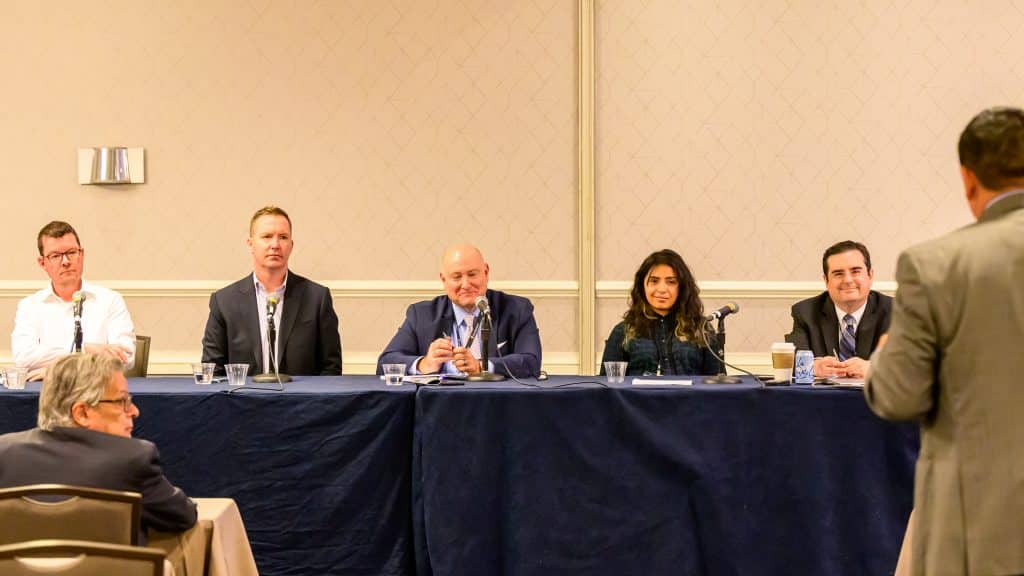
In a session on military service members’ rights, Department of Veterans Affairs (VA) educational benefits and Helmets to Hardhats, attendees learned about the laws and benefits protecting servicemembers and veterans — and how to put those laws and benefits to work in JATCs.
And SMART General President Emeritus Joseph Sellers moderated a panel on investing in commercial real estate with leaders from Ullico and the AFL-CIO Housing Investment Trust (HIT), diving deep on questions of commercial real estate and detailing how investing in labor-forward companies can reap dividends for everyone. One example: the AFL-CIO’s investment in housing construction, which creates union jobs and yields a return on investment for union funds.
On Tuesday night, SMART local officers and International staff gathered for the annual SMART Political Action League (PAL) reception, where SMART General President Michael Coleman awarded plaques to the 31 local unions whose members donated the most, per capita, to the PAL fund – helping SMART support politicians who work to create jobs and protections for union sheet metal workers.
Wednesday: demonstrating our political power, lobbying for more
Attendees came together on the final day of the NABTU Legislative Conference to hear from governmental allies on the federal, state and municipal level, and to lobby Congress to pass pro-worker policy that creates union jobs and benefits our members.
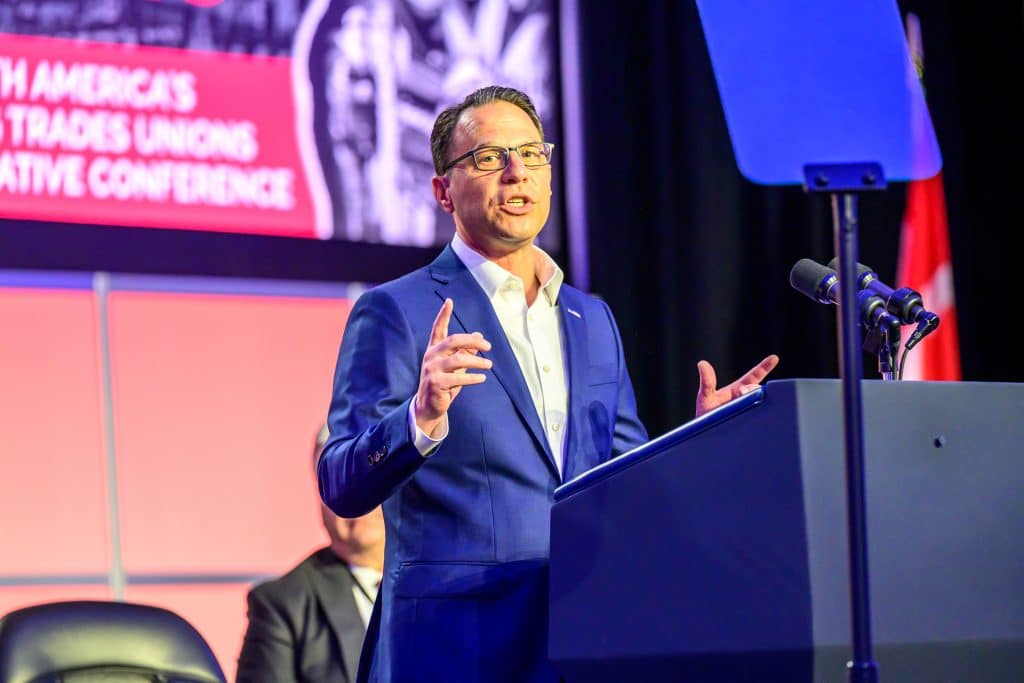
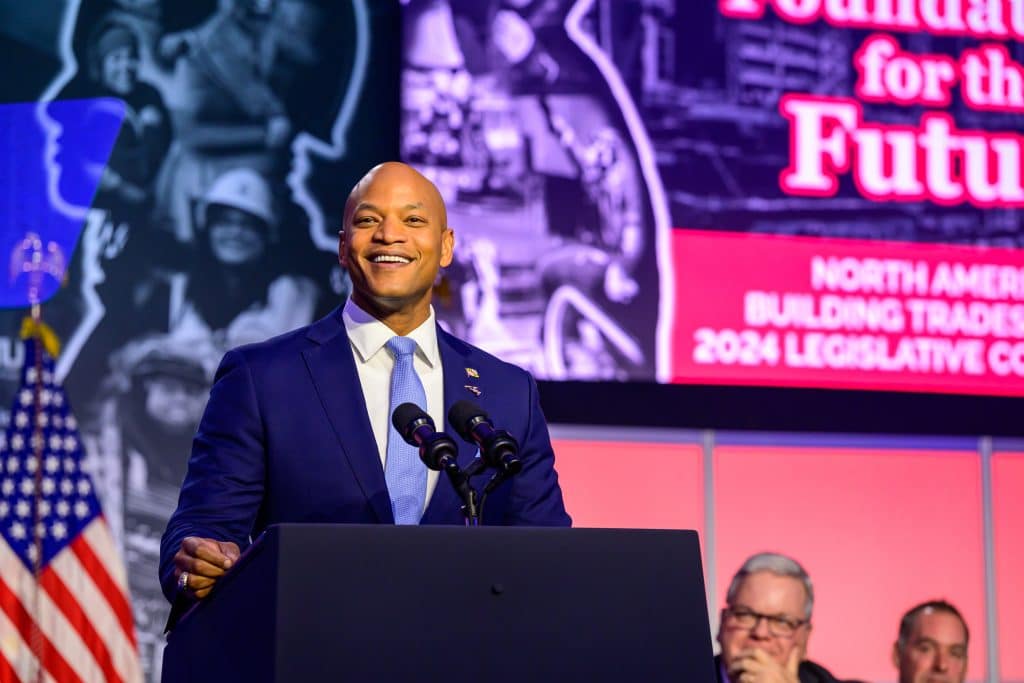
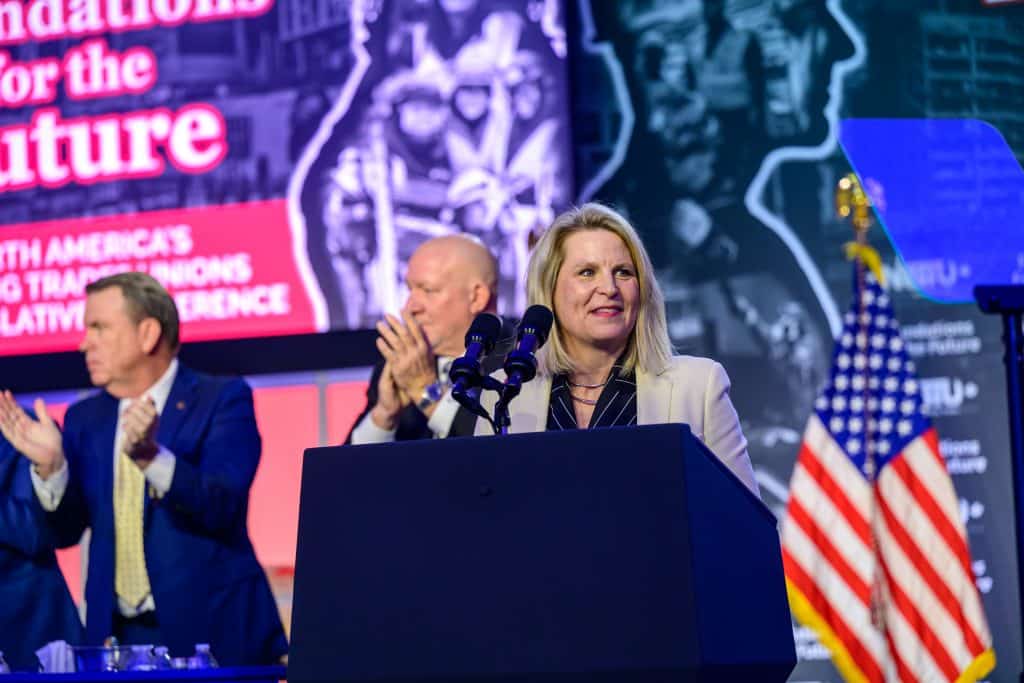
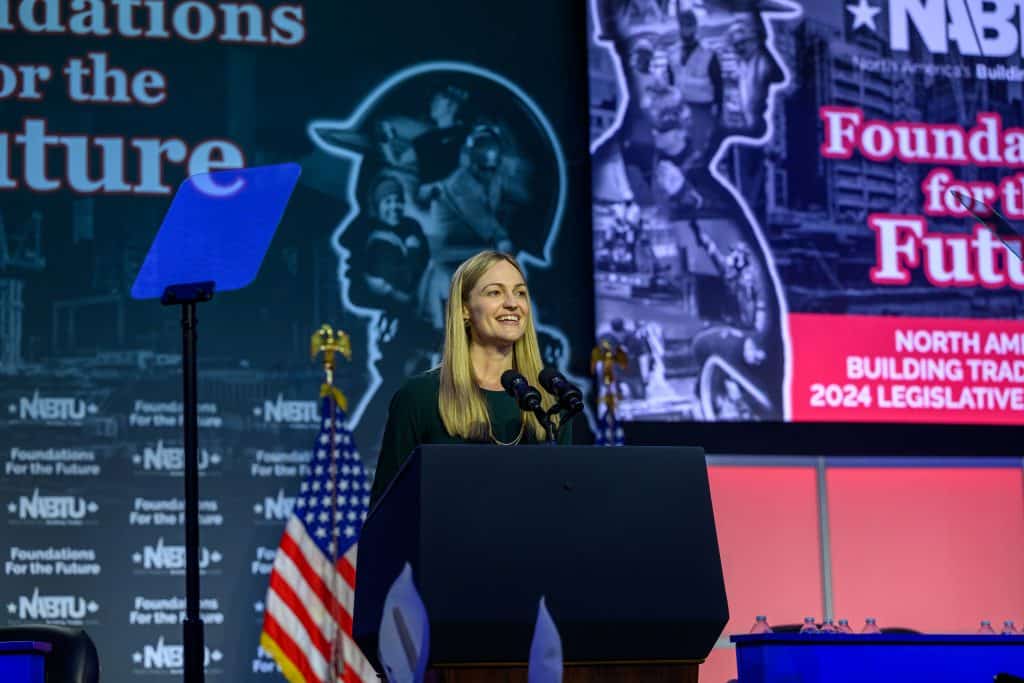
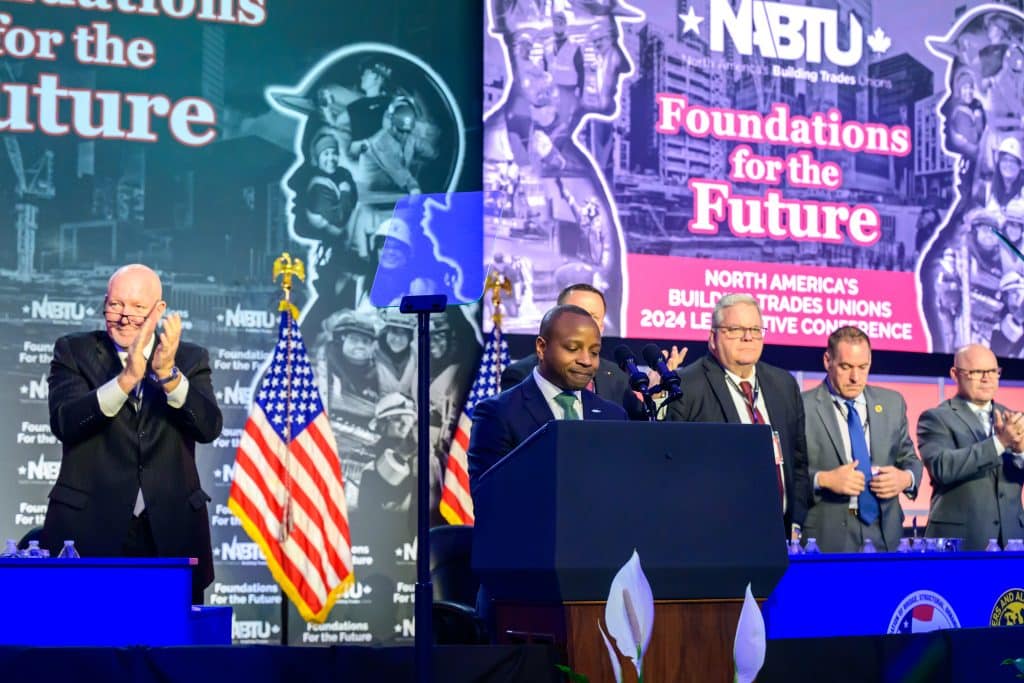
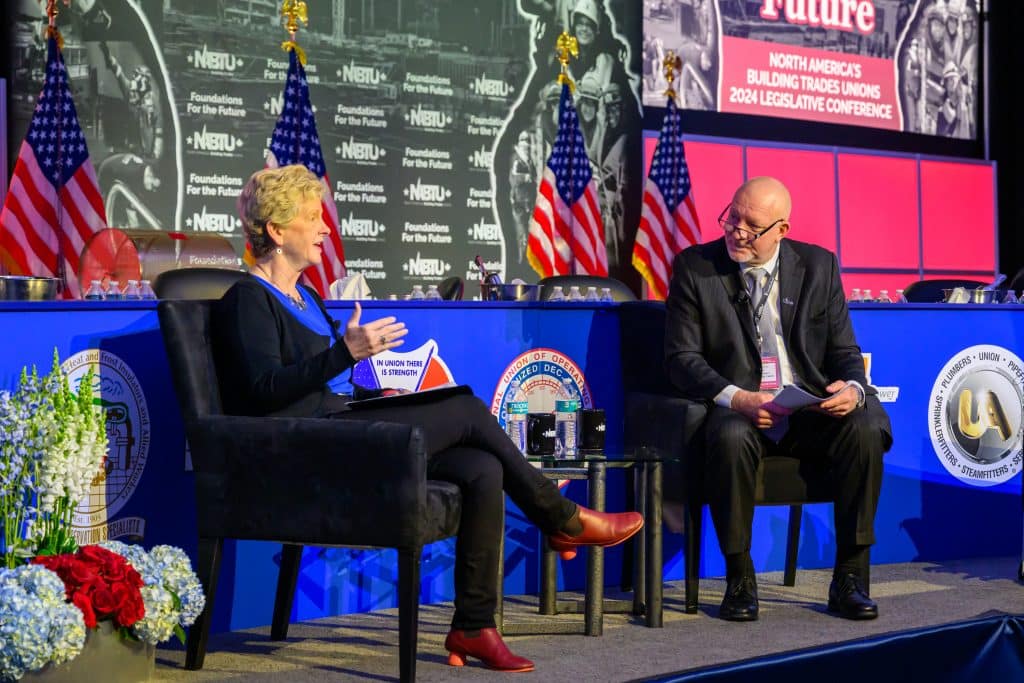
The morning began with a fireside chat with U.S. General Services Administration (GSA) Administrator Robin Carnahan, whose implementation of strong labor standards for projects related to federal facilities has put SMART members to work across the country. As the manager of federal government properties, acquisitions and more, the GSA is one of the largest players in the country when it comes to building, maintaining and retrofitting buildings, and as a pro-labor official, Carnahan has strived to ensure that work is performed using union workforces. She and NABTU President McGarvey discussed, among other things, the value of project labor agreements and how federal legislation provides the money GSA needs to put union members to work on “greening our federal carbon footprint.”
“Project labor agreements are just good business,” Carnahan declared.
U.S. Department of Energy (DOE) Secretary Jennifer Granholm also spoke to attendees on Wednesday, outlining the ways in which the department is implementing funding from the Bipartisan Infrastructure Law, the Inflation Reduction Act and the CHIPS and Science Act to pursue a decisively pro-union green energy policy. Thanks in large part to the public and private clean energy jobs breaking ground every day, Granholm said, construction employment is at its highest level in recorded history.
“These jobs are the result of a focused, strategic plan; a new industrial revolution is taking shape,” she told attendees. “It is historic, and your labor unions had a hand in shaping this strategy every step of the way. These wins belong to you.”
Liz Shuler, president of the AFL-CIO and a longtime fighter for SMART members, took the podium to talk about labor’s resurgence — and the importance of maintaining a policy platform that makes it possible for unions to organize, build, grow and win. From a pro-labor National Labor Relations Board to updates to prevailing wages and job-creating laws, she said, it is more vital than ever to vote for union members’ interests in November.
“It does not matter which craft you are in, people respect the building trades,” Shuler declared. “People recognize that you are the ones that build our nation. … Finally, people recognize that the labor movement is the place to build power.”
And on the state and municipal level, Milwaukee Mayor Cavalier Johnson, Scranton, Pa., Mayor Paige Cognetti, Pennsylvania Governor Josh Shapiro and Maryland Governor Wes Moore detailed the myriad ways in which pro-labor policy is extending from the federal scope to benefit union members in states and cities with a shared pro-worker outlook.
Johnson explained how Milwaukee works hand in hand with Wisconsin building trades workers to build a better city for residents, from huge residential projects — funded in part by the AFL-CIO Housing Investment Trust — to core infrastructure (much of it made possible by money from the Bipartisan Infrastructure Law and the Inflation Reduction Act).
“[The building trades] are working to make sure that they represent the interests of their members, yes, but those interests also coincide with what’s best for the city; what’s best for residents all across Milwaukee,” he said.
Cognetti, meanwhile, discussed how unions in Pennsylvania are helping lift workers in Scranton into the middle class — again, boosted by funding from federal legislation. Through workforce navigation money from the American Rescue Plan and infrastructure funds from the Bipartisan Infrastructure Law, Scranton is helping lead people to apprenticeship programs and putting members to work on core public works projects. Plus, Cognetti’s administration has instituted strong labor standards in the city: Any $25,000-plus project funded by the city or the state government pays a prevailing wage, and Cognetti is proposing a responsible contractor ordinance this spring.
Maryland Gov. Moore detailed his long personal history with the labor movement, starting when his father died when he was three years old — and his father’s union paid for the funeral. Decades later, Moore talked about the importance of investing in apprenticeship programs and putting union members to work on infrastructure projects — particularly as the state mourns the deaths of six construction workers in the devastating Key Bridge collapse in Baltimore. That bridge, he said, will be rebuilt with union labor. And moving forward, he vowed, Maryland will continue to invest in its workers.
“When people say that you have to somehow choose between having a growing economy and a fair one, it’s a false choice. We don’t have to choose, because we can and we will have both,” Moore declared.
And Shapiro, a longtime friend of SMART Local 19, Local 12 and Local 44, went long on his relationship with organized labor and how working with the union building trades has helped Pennsylvania accomplish incredible things — not the least being the repair of the I-95 highway collapse in just 12 days in 2023. Shapiro, who issued a directive to all agencies in the commonwealth of Pennsylvania to use project labor agreements whenever possible (a directive that went into effect April 1), explained how policies like responsible contractor ordinances and PLAs benefit workers, high-road contractors and the building tradespeople of the future. And in order to benefit those future trades workers, Shapiro told NABTU, he signed an executive order to create a first-in-the-nation initiative to invest up to $400 million in federal funding to train up to 10,000 new workers in Pennsylvania.
“We are giving every Pennsylvanian the freedom to chart their own course and the opportunity to succeed,” Shapiro said to a standing ovation. “We have a tremendous opportunity right now – and the progress we make is going to run right through your union halls.”
The conference’s final plenary session concluded with a speech from President Biden, who just that morning received NABTU’s endorsement in the United States presidential race. Biden drew a stark contrast between the anti-worker actions of 2016-2020 — a union-busting NLRB, a promised “infrastructure week” that never arrived and more — with the progress workers have made since 2021: 51,000 projects started since the passage of the Bipartisan Infrastructure Law; 15 million jobs created; an executive order requiring project labor agreements on federal jobs that cost more than $35 million; Davis-Bacon updates that expand prevailing wages for construction workers; and the repealing of Trump’s proposed Industry Recognized Apprenticeship Programs (IRAPs) rule, to name a few.
“Trump promised us an infrastructure week, but I’ll tell you: In four years, he didn’t build a damn thing,” Biden said.
With a pro-worker majority in Congress, more is possible, Biden added, calling for the passage of the Protecting the Right to Organize (PRO) Act.
“It’s just beginning,” he proclaimed. “Roads, bridges, ports, airports, clean water systems, available high-speed Internet all across America and built by the building trades.”
Following President Biden’s speech, SMART members and trades workers departed for Capitol Hill, where they met with legislative staffers to push Congress to act on our behalf. And as attendees returned to their home locals over the following days, they carried the message resounding throughout the conference halls to union members across the country: We need to advocate for our interests, at the ballot box and beyond, to secure our collective future.
Related News
- Building a labor movement that secures our future
- Bipartisan congressional relationships stand to benefit SMART members
- NABTU Legislative Conference brings SMART members to DC to push for pro-worker policy
- Arizona chip plant megaprojects create hundreds of jobs for sheet metal workers
- Local 18 sisters win NABTU Tradeswomen Heroes award
- Local 18 fourth-year apprentice wins October Tradeswomen Heroes award
- NABTU Legislative Conference highlights opportunities ahead for SMART members
- Lisa Davis, 16-year journeyperson at SM Local 16, wins NABTU Tradeswomen Heroes Award